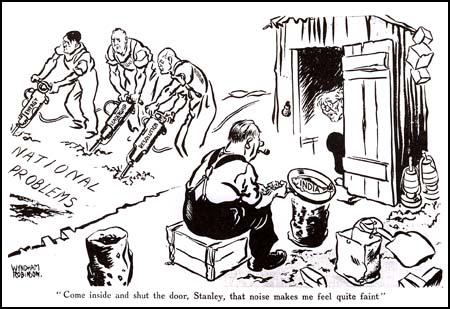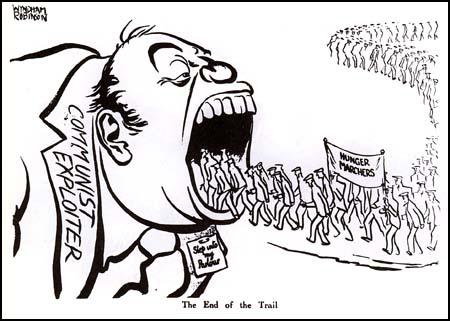Wyndham Robinson
Wyndham Robinson, the son of a journalist, was born in London in 1883. He studied at the Lambeth Art School and the Chelsea School of Art. He intended to become a fashion artist but after seeing the work of Will Dyson he decided to become a cartoonist.
On the outbreak of the First World War he joined the Artists Rifles. The regiment largely consisted of painters, sculptors, engravers, musicians, architects and actors. Some of the artists who joined the regiment in 1914 included Edgell Rickword, Charles Jagger, Wilfred Owen, Bert Thomas, R. C. Sherriff, Edward Thomas, Paul Nash, John Nash, John Lavery, Alfred Leete, Frank Dobson, Eric Blore and Eugene Bennett.
Robinson was transferred to the Royal Field Artillery and served on the Western Front, attaining the rank of captain. After the Armistice Robinson spent a year in Germany with the Army of Occupation. He then moved to Southern Rhodesia where he became a tobacco-farmer. In 1928 he returned to cartooning and worked for The Cape Times.
In 1932 Robinson was appointed as the political cartoonist for The Morning Post. During the Great Depression he became a strong critic of the government of Ramsay MacDonald. In one cartoon published on 31st July 1933, Robinson's compared MacDonald's inactivity with that of Franklin D. Roosevelt, Adolf Hitler and Benito Mussolini. He also portrayed Stanley Baldwin as disinterested in the subject.

According to Martin Walker, the author of Daily Sketches: A Cartoon History of Twentieth Century Britain (1978): "Wyndham Robinson, one of the most talented cartoonists to emerge in the 1930s... made the valid point that such Depression-beating energy could be mobilised quite as effectively by that other great democracy, the US, under Roosevelt and the New Deal. By comparison, MacDonald is an old woman."
Wyndham Robinson believed that there was a strong danger that the unemployed would be attracted to the policies of the Communist Party of Great Britain. This was reflected in the cartoon, The End of the Trail, published in The Morning Post on 10th November, 1936. The following year he joined the The Daily Telegraph. He also had his work published in Punch Magazine, London Opinion and The Tatler.

